Yves here. It is disappointing but predictable to see many of the Democratic Party aligned groups dedicate themselves to “fighting Trump” without concentrating their efforts on targets that pose high risks to many American citizens and have obvious vulnerabilities. I would put DOGE top of that list. Broad-based program and spending whackage, which is what the DOGE perps have vowed to do, would disrupt the lives of many.
DOGE would seem ripe for legal challenge. Just a couple of examples: The initiative, as described so far, is not properly constituted. You can’t have randos acting as if they were Federal officers or employees. Impoundment, as in refusing to make expenditures authorized by Congress, is also illegal. See this explainer for details.
So while I am very grateful to Rob Urie for taking up this topic, the lack of a sense of urgency in publicizing the destructive intent of DOGE, let alone opposing it, says a lot about what the priorities within the Democratic Party really are.
I do have one quibble with Rob’s analysis. He implies that the bailouts of financial firms could have been expected to generate inflation. That is erroneous. The bailouts were of the form of super low interest rates (which goose asset values but are not net fiscal spending) and QE, which is an asset swap designed to lower longer-term interest rates and again is not “printing money”. Banks got TARP loans on extremely concessionary terms which they did pay back.
It was later admitted by no less than Larry Summers that the stimulus package should have been bigger than $1 trillion to adequately offset the deflationary impact of falls in asset values, most of all residential real estate, but $1 trillion was seen as politically unacceptable (by who? the deficit monster?) and so the outlay was smaller.
By Robert Urie, author of Zen Economics, artist, and musician who publishes The Journal of Belligerent Pontification on Substack
Apparently unbeknownst to my Republican friends, the effort to cut ‘government waste’ has a long, bipartisan, history in the US. While Republicans point to Ronald Reagan as the original budget chide, the Federal budget deficit doubled under Reagan (graph below). It was Democrat Bill Clinton who last ‘balanced the budget,’ a feat that was rapidly followed by a deep and lasting recession. And Joe Biden dedicated his career to cutting Social Security, Medicare and Veteran’s benefits.
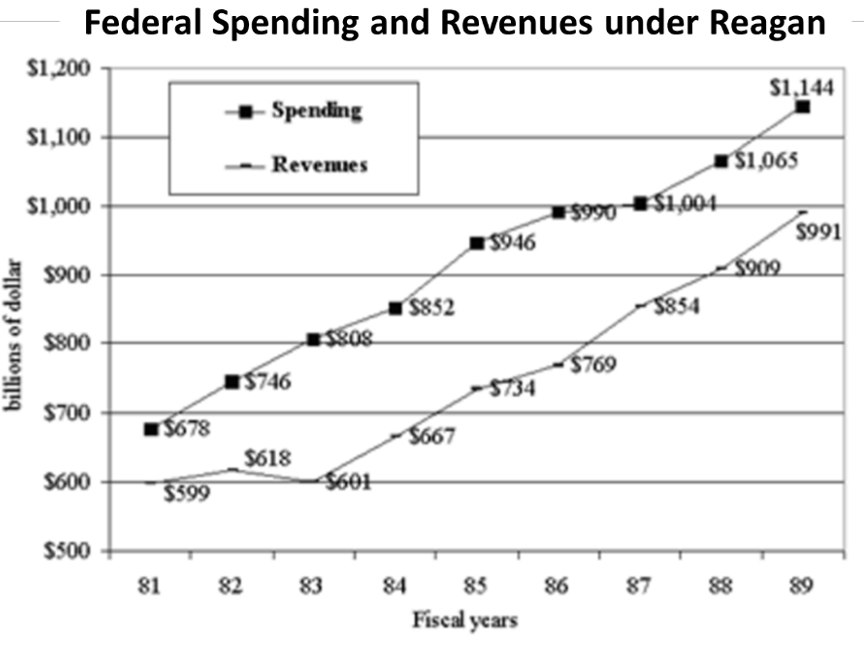
Graph: despite his rhetoric, Ronald Reagan was unable to make meaningful headway in ‘resolving’ the Federal budget deficit. The deficit was larger when Mr. Reagan left office than when he entered. It was Bill Clinton who achieved a brief surplus, just before the US economy entered a deep and lasting recession. That Clinton isn’t a hero of the Reaganites is significantly explained by Republicans having no knowledge of this history. Source: cato.org.
Over the years, US Presidents Nixon, Carter, Reagan, H.W. Bush, Clinton, W. Bush, Obama, Biden, and now Trump, have all paid fealty to the canard of ‘living within our means.’ Note the partisan bias in this list of names: there is none. Bill Clinton even hallucinated an entire ‘market’ theory of fiscal austerity, the ‘bond vigilantes,’ suggesting that God, via markets, is deeply concerned about American fiscal probity.
The term ‘efficiency’ reeks of moral fiber, of rectitude, of a capacity to do basic budgetary arithmetic. It appeals to Max Weber’s Protestant ethos of capitalism, to modesty, thrift, and decency toward the world. However, as with the inexorable logic of arithmetic, what is counted is a matter of what gets counted, and not ‘the math’ per se. When bodies start to pile up from this policy or that, the social violence soon enough becomes difficult to contain.
Through siloed discourse, few political conservatives know that Barack Obama structured his signature program, the ACA (Affordable Care Act, Obamacare), using the same capitalist principles that Elon Musk is currently espousing. Mr. Obama’s goal was to make the American healthcare system better by making it ‘more capitalist.’ With health insurers currently in the news for denying legitimate claims at rates suggestive of looting, the ACA is indeed capitalist. One’s view on whether this is a good thing likely depends on whether one is an insurer, or the insured.
What ‘efficiency’ has meant in the case of the ACA is that executive compensation has been raised through health insurers denying legitimate claims— nearly without restraint. The rollout of the ACA has been accompanied by a catastrophic rise in ‘excess deaths,’ of Americans dying from preventable causes that wouldn’t have if the ACA ‘worked.’ That Democrats consider the program a success suggests that making executives rich by killing large numbers of Americans was their intent.
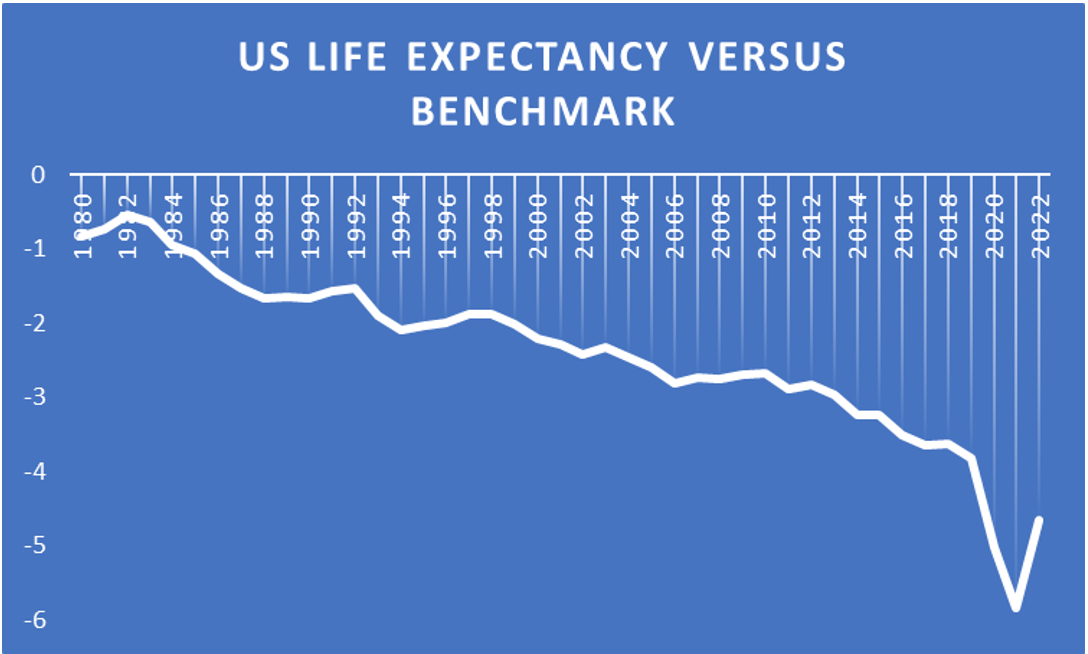
Graph: compared against a benchmark of life expectancy data for peer nations, the graph illustrates relative life expectancy in the US to be below that of peer-nations in 1980, the year that Ronald Reagan was elected. The decline continued after 1980. Americans currently live five fewer years than the citizens of peer nations. Throughout history, governments have been toppled for less egregious outcomes. But none of the architects of the current system are being held to account for this catastrophe. Source: healthsystemtracker.org.
In practice, capitalist efficiency is treated as an optimization problem dependent upon a chosen goal. If efficiency means getting more from less, the question becomes: more of what? While the concept of efficiency implies a physical optimization, e.g. producing four toaster ovens using the same quantum of inputs previously used to produce three toaster ovens, in practice, the capitalist goal is to maximize corporate profits, a monetary measure. And here is where it becomes political.
Suddenly the problems of physical optimization, of optimizing around physical constraints, is broadened to include capitalist social organization in its method. If a five-percent rate of profit can be earned from producing toaster ovens, but a ten-percent return is expected from buying a stock index fund, the optimal solution based on the goal of maximizing profits is to stop making toaster ovens and invest the proceeds in the stock index fund.
However, if every manufacturer of toaster ovens does this, toaster ovens will soon be hard to come by and stock prices overvalued. Further, selling off the assets of a toaster oven manufacturer to raise the money needed to buy the stock index fund is expensive, cumbersome, and time consuming. And if enough manufacturers follow this strategy, the market for toaster oven manufacturing equipment will be flooded and prices will plummet.
The question then is: how does the common-sense view of efficiency as frugality, as producing as much as one can within the limits of what one has, shift to the realm of social relations where frictions and the set of available opportunities are both changeable and moveable? The ‘innovation’ of money renders liquid, or transactable, the social aspects of economic production in a way that physical quanta will never be.
The pushback against DOGE here isn’t reflexive. Many Americans likely share the view that much of what the Federal government does shouldn’t be done. For instance, why are the FBI and CIA interfering in US elections? Why is the US funding and arming Israel? Ukraine? Why is the Federal government militarizing the police by producing military ‘surplus’ to supply them with? And why is oligarchy the only choice on the ballot?
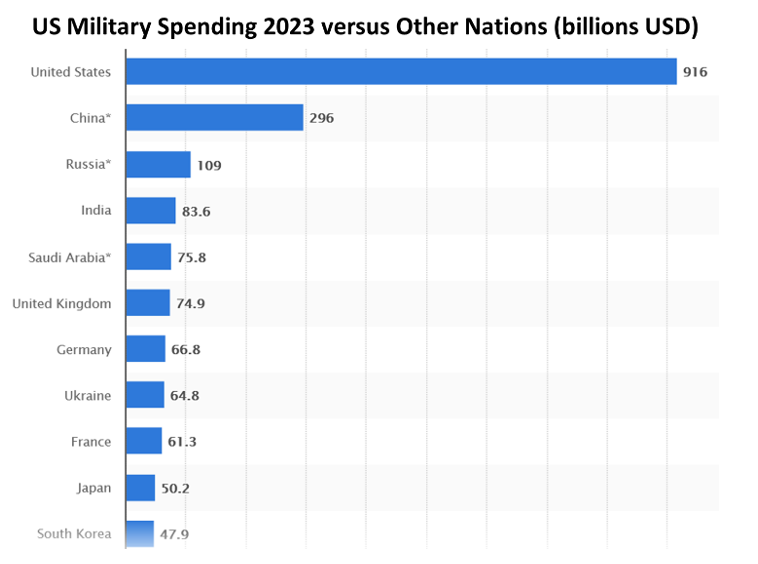
Graph: the US has the highest ‘defense’ expenditures in the world by several multiples. If capitalism is efficient, why isn’t the US spending less on defense than non-capitalist countries? The answer: that through supporting 800 US military bases abroad, we buy a lot more of it, begs the question, why? For three centuries Fortress America, being sandwiched between the Atlantic and Pacific oceans, has meant that the US should spend far less on its defense than other nations. But the opposite has been the case. Source: statista.com.
In terms of national accounts, one person’s ‘waste’ (e.g. Pentagon budget) is another person’s paycheck. What this means is that 1) budget battles produce winners and losers and 2) the gains go to the winners, and not to ‘the nation.’ And Elon Musk is a poster child for dependence on Federal handouts. Not only do ‘his’ companies receive direct transfers from the Federal government (link below), but much of Musk’s wealth comes from two Federal bailouts of Wall Street.
Historically, austerity policies have found industrialists arguing that Federal subsidies to nominally private enterprises (such as Tesla and SpaceX) are ‘efficient,’ while social spending is ‘waste.’ This view is based in / on the web of related theories that constitute capitalist economics. As with earlier efforts, fans of austerity leap from local examples to global conclusions without apparently understanding that the economic logic doesn’t tie to the political conclusions drawn.
Soon after entering office, Ronald Reagan cut taxes and social spending while increasing military spending. Assessments of the policy are complicated by Paul Volcker’s, Jimmy Carter’s Chair of the Federal Reserve, effort to strangle the economy with sky-high interest rates. What Reagan did manage to prove was John Maynard Keynes’ theory that increasing Federal spending in an economic downturn (military Keynesianism) would boost the economy (top graph in this piece).
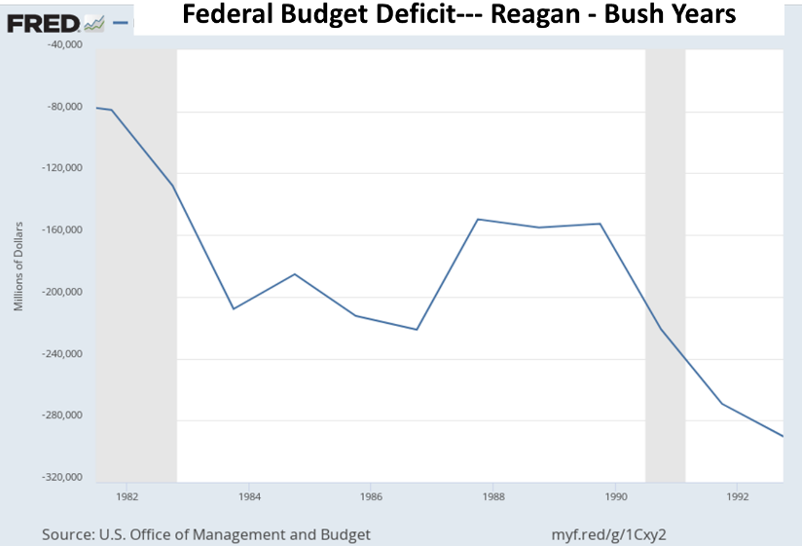
Graph: within the terms of his own economic program, Ronald Reagan’s policies of cutting taxes while increasing Federal defense spending significantly ‘worsened’ the Federal budget deficit. This is partly due to the fact that the theory that cutting taxes increases government revenues (‘Laffer curve’) was never scaled because it is an ideological argument, not empirical. The similar terms being laid out by Trump in the present— a wider war in the Middle East while Federal domestic expenditures are cut, will yield similar results. The point: deferring to Reagan’s actual policy results is a loser for supporters of DOGE. Source: St. Louis Federal Reserve.
Note: this is not how Reagan and his supporters explained their results. The theory that cutting both taxes and social spending raises economic output was born. However, this conclusion is roughly analogous to writing a review of the play at which Abraham Lincoln was assassinated without mentioning the assassination. The facts come in pieces here. Cutting taxes and social spending work in opposite directions economically, not the same.
The theory that cutting taxes boosts economic output has empirical support, but not for the reasons that proponents claim. Cutting taxes boosts consumption, depending on the ‘propensity to consume,’ by leaving more money in the hands of consumers, and not by shifting economic production from government to ‘private’ enterprise. By analogy, Medicare is more ‘efficient’ than private health insurance in terms of both managing costs and producing good health outcomes. Medicare is a program of the Federal government. The point: the question of ‘efficiency’ isn’t answered by ‘government versus capital’ framing.
(MMT— Modern Monetary Theory, has a very different explanation of the relationship between taxes and economic output that readers with an interest would do well to acquaint themselves with).
This distinction is important because the result of DOGE, to the extent there is any, will be to privatize government functions for the benefit of oligarchs and Wall Street. For instance, NASA, the space agency of the US, has essentially outsourced the US space program to Elon Musk (and Jeff Bezos) under the theory that they can run it more efficiently than NASA can. But basic arithmetic argues against this theory.
Private enterprise must earn a rate of profit that the Federal government doesn’t in order to legitimate the social distribution of income and wealth. If the rate of profit is, say, 6%, this is 6% more that ‘private’ providers must earn to break even with Federal results. The US DoD (Department of Defense) actually offers ‘cost-plus contracts’ to guarantee private military contractors a rate of profit.
So, which is more efficient, for the Federal government to produce military equipment itself, to pay contractors to do so with a guaranteed rate of profit, or to put the question to ‘markets?’ There is no generic answer to the question. Each instance requires defining the intended outcome and estimating costs and methods. With the experience of Medicare in hand, there is no generic guarantee that the private solution is the most ‘efficient.’
The private health insurance ‘solution’ inflicted on the US has produced the worst outcomes amongst peer nations (see graph of life expectancy above) by a margin so wide that it should disprove the fantasy of capitalist efficiency from this moment forward. That Americans don’t know how bad these outcomes are suggests that the powers that be do know how bad they are. There is no benefit for Democrats from making these results known. And the only ‘private’ solution for Republicans (more capitalism) will produce even worse results than the Democrats have achieved.
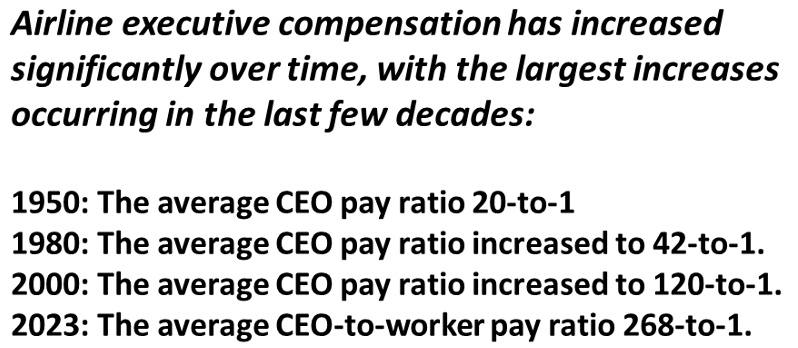
Chart: airlines are considered here because they were amongst the first industries to have their public purpose shifted from transporting people to earning profits. When Jimmy Carter began deregulating transportation infrastructure in the late 1970s, the measure of industry efficiency was the number of people transported safely from one place to another. In this way, shifting the metric of concern from people to profits was political. With the current ratio of CEO-to-worker pay of 268:1, firms could instantly increase their ‘efficiency’ by firing their C-suites and replacing them with lower cost alternatives. Source: multiple.
Reagan’s economic thesis, tied to capitalist theory, had it that Federal spending is wasteful because of incentives. Question: why would private enterprise be more efficient than government? Both are structured hierarchically, meaning that they feature executives giving direction to the workers ‘below’ them. The capitalist theory is that ‘incentives’ motivate better outcomes. So, why not give incentives to government workers? Wouldn’t doing so ‘equalize’ them with private industry?
Giving Federal workers performance bonuses has actually been tried. Some Federal workers receive performance bonuses equal to up to 10% of base pay. But the real bonuses are paid when regulators and legislators leave government to take jobs with the corporations that they formerly regulated. These ‘revolving door’ jobs are limited to senior managers, suggesting a fungible, class-based, economy separate from the experience of, and outside of the purview of, rank-and-file workers.
Ironically, of sorts, coincident with this ‘revolution’ in economic understanding that people require incentives to give their employment their all has been a five-decade-long effort to reduce the economic incentives paid to labor (graph below). The result: it now takes two working adults to earn what one working adult earned (in inflation-adjusted dollars) a generation ago, leaving no one to raise children or maintain the household.
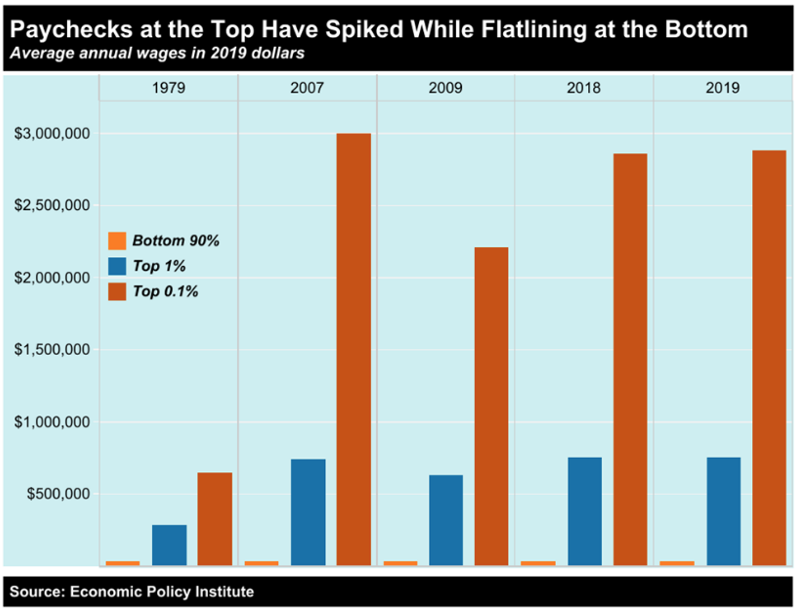
Graph: how can Western economists proclaim the importance of financial incentives to capitalist production when they don’t apply to 90% of American workers? The average variable, or incentive, pay in the US in 2024 was 9.6%. But this conflates the experience of executives earning 400% of their base pay in bonuses with workers receiving 3%. Source: inequality.org.
Another question to ask: what type of behavior does incentive pay motivate? Brian Thompson, the recently deceased CEO of United Healthcare, was paid large bonuses to kill ‘his’ customers by denying their legitimate insurance claims. The point: in the case of United Healthcare, capitalist ‘incentives’ legitimated the killing of thousands, possibly tens of thousands, of the firm’s ‘customers.’ So, why isn’t health insurer efficiency measured in life hours saved (graph below) rather than corporate profits?
Do incentives work in terms of big picture efficiency? In 2014, the year that the ACA was implemented, Americans lived 3.5 fewer years than did the citizens of peer nations. In 2022— eight years later, we live five fewer years than do the citizens of peer nations. Health insurance industry profits rose, executive compensation increased, and Americans have died at rates only seem in history in full-blown societal collapses (chart below). So no, the ACA goal of raising executive compensation has produced worse health outcomes, not better.
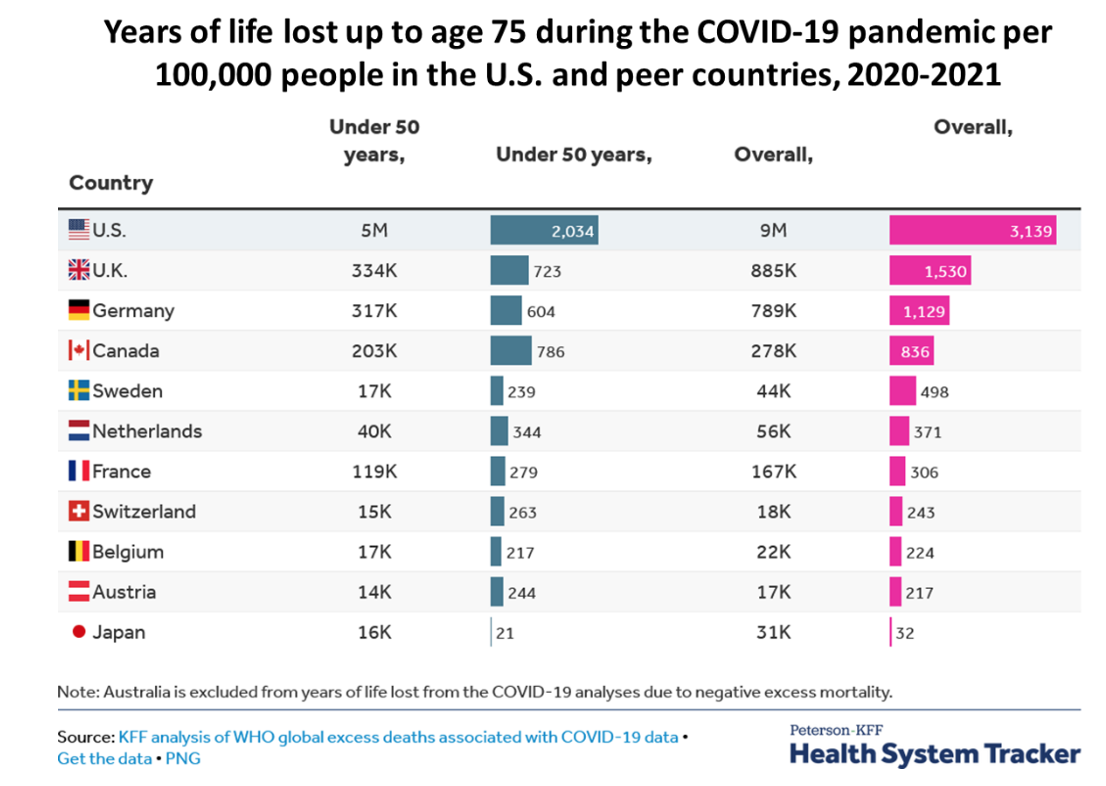
Chart: despite the ACA having been implemented six years before the Covid-19 pandemic hit, the US had the worst mortality rate amongst peer nations by several multiples. With the arrival of the Omicron variant of Covid-19, fifty-percent again more Americans died under Biden over a similar time period than died under Trump. This point is made because Biden recently shoveled hundreds of millions more in Federal largesse into the health insurers, apparently as compensation for killing more Americans than all US wars combined have. Source: healthsystemtracker.org.
The point here is likely different than imagined. The point is that economic ‘efficiency’ depends on what the chosen objective is. If raising health insurance industry profits and executive compensation was / is the objective, then the ACA is an inspiring success. Government works! If the objective was to improve health outcomes for the people, this has not occurred. (Send me your evidence. I’m glad to debate this). But neither objective was handed down from God. Either is a social choice.
Early evidence for this conclusion can be found in the Republican debate over h-1b visas. Tesla employs about a thousand h-1b visa holders. Elon Musk is the Grand Poobah of Tesla. Musk maintains that the program allows Tesla to import skilled workers. However, as with the ACA and the health insurance industry, there is a history of large, industrial employers and contracting firms using the h-1b program to steal wages from workers. The point: when left to employers, robbing employees and customers enters quickly as an option.
My Republican friends argue that the ACA is ‘communist’ or ‘communistic’ without considering that if this is true of healthcare spending, it is also true of military spending. What they mean is that the ACA provides undeserving people with something for nothing. With the evidence from United Healthcare in hand, health insurance on which 30% – 40% of claims go unpaid is a lottery ticket, not insurance. The beneficiaries of the ACA are, again, health insurers and their executives. The proof: ‘excess’ deaths are through the roof, along with health insurer profits and executive compensation.
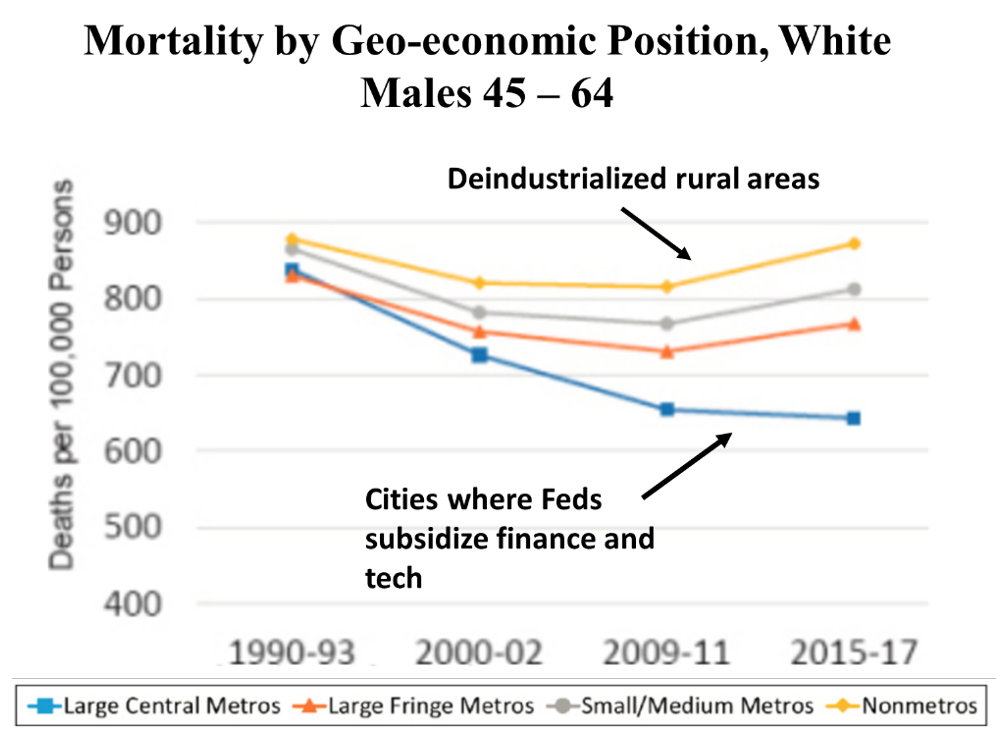
Graph: while the group represented in the graph is relatively narrow, white males between the ages of 45 – 64, the results are broadly representative of American political economy. Following the onset of the Great Recession in late 2008 or thereabouts, Federal bailouts revived the economic fortunes of the urban bourgeois. This, as the not-connected who live outside of Wall Street and Silicon Valley were left to their own devices. As mortality rates for the newly bailed-out urbanites were plummeting, they rose for every other segment of the population. The link provides details for the broader population. Source: nih.org
From Reagan forward the Pentagon budget has been a rallying point for demands for government ‘efficiency,’ if not quite in the way currently imagined. The point of confusion appears to be the units of concern, ‘individuals,’ versus ‘the nation.’ This can be rectified easily enough by putting military spending in terms of individual benefit. The per capita (person) Pentagon budget for 2024 is a tad over $2,200. This means that for a family of four, Mom, Dad and two kids, the annual Federal outlay for the Pentagon is $8,800.
Conceiving the Pentagon in the same way that the ACA is, as Federal outlays paid per individual for their own personal benefit, finds that $2,200 per person per year is paid. Recall, the ACA benefit, to the extent there is any, isn’t ‘paid’ to individuals. It is paid to health insurers, much as the Pentagon budget is distributed to MIC suppliers and contractors, not to citizens. Question: why would someone who is undeserving of healthcare be deserving of national defense?
Further, the US hasn’t ‘won’ a war since WWII. And in that case, it was the Russians (Soviets) who won WWII. If efficiency at the Pentagon is graded by how many wars the US has won since WWII, the grade is F. What then is the correct measure of ‘efficiency’ when it comes to national defense? The number of wars won? The destructive power created per dollar spent. The political state of the West? The answer depends on one’s interests. So. What are Trump’s / Musk’s interests with respect to the Pentagon? SpaceX? The US?
The mutual disdain that the political parties in the US are able to generate and maintain is a product of the differentiated material realities that are supported by differentiated discourses (graph above). When the US entered economic crisis around 2008, bailouts of the malefactors were quickly organized, leading those whose livelihoods were tied to Wall Street to quick recovery. The heavily subsidized US tech industry also quickly recovered. But this hasn’t been the case for the other 80% – 90% of Americans (graph above).
The analogy of the Federal budget to either a corporate or family budget is flawed for very basic reasons. The Federal government has the legal authority to create money. Corporations and households don’t. For example, should a family want to buy a car, it can pay for the car from savings or borrow the money to buy it. What it cannot legally do is ‘print’ the money needed to buy the car. The same is true, with some differences, for state and local governments and corporations.
My Republican friends argue that ‘money printing’ is in all cases counterproductive. But the actual risk of inflation is contextual—it depends on resource constraints, not simply on economic demand. Barack Obama ‘printed’ somewhere around $19 trillion USD to bail out Wall Street in 2009. But most of this was never drawn down, meaning that it never entered the economy. Deflation was the problem that Obama / Ben Bernanke were trying to solve, not inflation. The point: even in the face of large-scale ‘money printing,’ inflation was restrained from 2009 – 2020.
Had Mr. Obama’s ‘stimulus’ and bailouts been inflationary is the sense of causing a rise in the price of a broad basket of goods and services, my Republican friends might have a point. But in fact, what was proved (chart below) is that large amounts of money can be added to a depressed economy without inflation taking hold. This was a fundamental insight of economist John Maynard Keynes during the Great Depression. And it provided the theoretical justification for the Depression-era spending that eventually pulled the US out of the Great Depression.

Graph: despite the trillions in Federal largesse that Barack Obama delivered to Wall Street, inflation as measured by CPI was only 1.46% per year over Mr. Obama’s two terms. Source: St. Louis Federal Reserve.
Donald Trump clearly understood this when he promoted his $2.3 trillion pandemic relief program in 2020. Trump’s (and Biden’s) economic stimulus is widely blamed for the inflation that followed. However, corporate profits rose in lockstep with the rise in prices, meaning that producers were charging customers for price increases that they were not experiencing. Add this to health insurers killing their customers to earn larger bonuses and the social practice of capitalism is brought into the light.
For those who missed it, US Presidents have been promoting government ‘efficiency’ for five decades now. The result of those earlier efforts is the current state of the US. While ‘entrepreneurial’ spirits are applied to Donald Trump and Elon Musk, Mr. Trump was born rich and Elon Musk owes almost all of his fortune to fortunate timing. Musk took Tesla public in 2010, just as Mr. Obama was doing everything in his power to raise stock prices. And Mr. Trump’s ‘pandemic relief’ is more accurately described as the ‘save the stock market Act of 2020.’
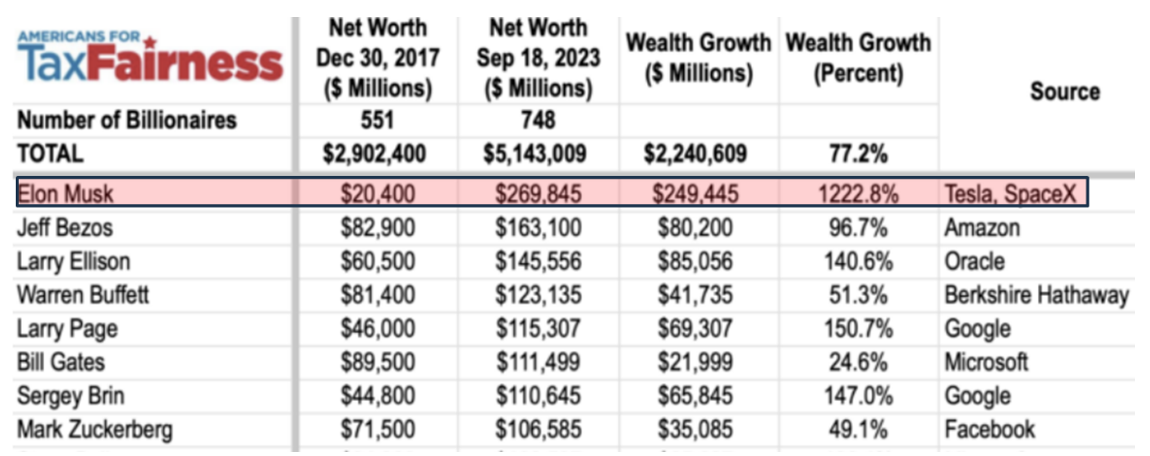
Graph: as a group, American billionaires have been the largest beneficiaries of Federal largesse in recent decades. Thanks in large measure to Federal contracts and Donald Trump’s Pandemic Relief bill, Elon Musk’s personal fortune grew twelve fold between 2017 and 2023. Should Musk’s percentage change in wealth impress, that Musk had less wealth in 2017 than the others (denominator effect) helps explain the difference. Source: americansfortaxfairness.org.
Recall that within capitalist explanations of income and wealth, skill and hard work are fundamental. In contrast, the wealth of American billionaires doubled after Donald Trump put his pandemic relief bill forward in 2020. How did the already rich in 2020 get already rich? They were already rich from when Barack Obama bailed out Wall Street in 2008. From 2008 – today, the best guarantee of getting richer has been to already be rich. This represents a rigged game, not returns to skill and hard work.
Partisan political frames detract from understanding American political economy. The current Republican conceit that Elon Musk is a radical here to shake up a moribund system misses that every President over the last five decades has made a similar pitch. And while economic predictions are notoriously difficult to get right, this is a guarantee: should DOGE get up and running, the rich will be made richer and the rest of us poorer. This isn’t because Trump and Musk are evil or singularly self-interested. It will because this is how the American economy has been set up to operate.
The people running the US continue to make the worst decisions in the history of bad decisions—for the rest of us. For themselves, the free money keeps on flowing. S&L Crisis? The rich got bailed out. GFC (global financial crisis)? The rich got bailed out. Stock market down because of the pandemic? The rich got bailed out. In each case ‘we’ were told that it was ‘the system’ that was being bailed out. But somehow the money always landed in the pockets of the looters, not the looted. The US is out of time to get this right. In the parlance of the age: sad.


Truth is that men like Peter Thiel and Elon Musk pay way too little tax
US turned West into Class War from Above
German wealth inequality is at US levels
>Truth is that men like Peter Thiel and Elon Musk pay way too little tax
Peter Thiel Made $5 Billion in a Roth IRA: How the Tech Entrepreneur Made a Tax-Free Fortune
One reason that the Democrats are offering spasms of fausse resistance is tribalism. Among Democrats, it is still an article of faith that the ACA / Obamacare is a remarkable piece of legislation. Too bad that I was thrown out of a plan that I had as a free lance with a deductible of 500 USD (because of a new prohibition against selling plans across state lines) only to end up employed shortly thereafter with a company plan with a deductible hovering at 5,000 USD or so, plus the arbitrary “out of network” fees that popped up capriciously.
So: “With health insurers currently in the news for denying legitimate claims at rates suggestive of looting, the ACA is indeed capitalist. One’s view on whether this is a good thing likely depends on whether one is an insurer, or the insured.”
It is hard to critique DOGE if you are committed to the idea that the ACA was a great reform and that Saint Luigi the Avenger must therefore be a terrorist.
The way NASA threads through this article is telling: NASA is an enormous success. Just the photographic archive is timeless and almost priceless, let alone the ability to land probes on Mars and keep Voyager going, somehow, all these years.
Yet what we see is something more like confiscation of NASA by the oligarchs.
They’d like to confiscate the so-called Social Security Trust Fund, too. It isn’t to ensure that you get a decent pension. Many of these DOGEoids surely don’t believe in pensions. They want to confiscate the money. And you can go and find a job as a greeter at a WalMart.
Find a job as a greeter?
No, you can go die from a fentanyl overdose while lying underneath a pile of filthy rags in a pool of your own excrement on a cold hard sidewalk.
“Fascism is as co-constitutive of capitalism as liberalism is. Liberalism corresponds to the operational aspect of surplus value exploitation in the core, whereas fascism corresponds to the operational aspect of primitive accumulation at its temporal and spatial boundaries.”
It seems it will be a dog’s breakfast in many countries at the public through…for the big dogs only, of course…
I think the problem with DOGE can be illustrated even in simpler terms. When you are firm and fire people or reduce producing stuff, the fired people are someone else problem, they no longer show on your books. However if you are state, then firing people means you just shifted them from one column to other (i.e. unemployed) and unless you find something productive for them to do, you are actually making things worse.
“Go die” is like taxing away people instead of currency.
Trained soldiers/sailors/marines/airpersons are perishable they go off to other jobs, leave the services etc. Laying them off is partial savings. Their equipment is worn out in training.
The “operations and support” part of DoD expenditures is growing 40% of total outlays. This money is for training to fight a theoretical war, and the stuff trained on like F-35 is increasingly hard to keep running in training.
Now should the US stop training for 2.5 wars say train for 1.5 you cut O&S by 40% and can let go a lot of soldiers.
Since DoD/MIC frontlines are in Iraq and Ukraine 6000 miles and 7 or 8 times zones away, we can cut those far away inconsequential to the common defense distractions!
Well, yes, Department of War is the part of government that has very fuzzy utility verging on nonexistent, which is true especially for US with its two water moats. However even there the question is if it’s better to have some kid learn to drive truck and maybe help once in couple of years with natural disaster recovery, or just let him live in flyover town on petty crime until he dies of overdose.
Of course defense is the exact part of government that will not be affected by such cuts, which I’m sure has absolutely nothing to do with the fact that in practice they don’t need to demonstrate any tangible results for the money spent.
But even DoD can’t use most of what’s left of the US labor force: doesn’t meet fitness standards.
These idiots are determined to see what’s hitting them in the face everywhere the look, so they turn back to their screens where they can retain image control.
not see
Great article, the section on healthcare should disqualify most of our current political leadership from office. “Great reforms” like the ACA, yet US life expectancy has been flat (or outright declined) compared to peer nations. The healthcare system needs massive reform, but I am not holding my breath on that one.
40 years ago this February I left honest [somewhat] employment in the operational Air Force for a good career in weapon systems acquisition.
US privatized its arsenals because we thought those guys in Springfield or Dayton would not be innovative! The innovation we got was increative booking profits!
We had Packard commission, etc even in those days before PC’s! We were “learning lessons” from the C-5 debacle! We were outspending the Russians.
Reagan came in and we bought 100 B-1s which Carter held up because it did not pass tests and he had worked for Adm Rickover in the navy where ships disappeared if done badly!
I was a federal employee, an employee of defense vendors (developing and making things for DoD) and support contractor in government offices.
The best measure of my weapon system acquisition performance was spending the taxpayers’ money within the strictures of 6000 plus pages of DoD manuals on creating checks to industry and individuals, with no regard for effect or efficiency!
The measure of DoD investments is 800 bases around the world, which need huge amounts of money!
First decide US runs an empire which must be reined in!
It’s frustrating to live in the United States of Amnesia, where the memory of how we developed our economy has been lost. Michael Hudson is one of the few economists who discusses the importance of government spending on infrastructure. He also recalls economists like Simon Patten who believe that to have a true free market the state needs to subsidize infrastructure to keep costs down, rather than having powerful monopolies enacting tollbooths at critical chokepoints. Patten said that public infrastructure is a fourth factor of production. But its role isn’t to make a profit. It’s to lower the cost of public services and basic inputs to lower the cost of living and lower the cost of doing business to make the economy more competitive.
Instead, it’s baked in that DOGE will seek to further privatize government infrastructure and make the US even less competitive.
But DOGE will further enrich billionaires, so there’s that
>With the current ratio of CEO-to-worker pay of 268:1, firms could instantly increase their ‘efficiency’ by firing their C-suites and replacing them with lower cost alternatives.
I’m sure Musk would love the idea of hiring an Indian management professional as Tesla’s CEO for $100,000.
Nice language throughout – referring to Musk as a Grand Poobah an especially deft trick.
Tweet in yesterday’s WC from some nitwit who was “onboarding” for DOGE who within a mere 2 weeks grasped the vast waste of US.gov. Yes, understanding the role and scope of operations for 100s of federal agencies was easy peasy for this brain genius – who also spoke of HR and Legal departments. Raising further questions about the structure of this mysterious entity. And I’ll ad this one: Are DOGE employees subject to the Hatch Act?
In this case, the Tweeter decided to forgo DOGE duties for their self-care journey. I assume others who’ve been tapped are so miserable everywhere and unwelcome at home that for those very special people the DOGE tree fort will be a welcome haven and glorious oasis of shared delusions.
Yves, thanks for sharing. But one question–is DOGE serious or not? At this point it is clear that Trumpism engages in a “flood the zone” strategy. I mean that Trumpism involves movement influencers putting out feelers, ideas, thoughts, and “proposals” well out of proportion to what can happen, perhaps aspirationally. The natural response to focus on the most outrageous or destruction ideas takes up mental effort and resources in media, by voters, and by critics. The process of attacking or criticizing then normalizes the most outrageous ideas in the minds of MAGA voters (whose heuristic is that anything a “lib” attacks must be good) and drains resources, while the actual efforts of day-to-day Trump appointees might focus on less extreme but often still stupid actions. So, has anybody figured it out–is DOGE a “flood the zone” gimmick or a real initiative?
Is this “flood the zone” you are referring to the same thing as “flood the zone with sh!t” as Steve Bannon put it?
I’m a fan of trying to create new coalitions in times of crisis.
Rather than seeing the populist right as a complete enemy (quite common in siloed discourse on both sides) why not focus on what the populist left and populist right may have in common in their economic thinking.
One starting point might be their apparent agreement on the idea that markets (of any type) are never in equilibrium thanks to price movements that have equated demand and supply. See the writings of both Steve Keen and Richard A. Werner.
Might go from that starting point to discussions about the proper role of banks (Central
Banks, Big Commercial Banks, Small Community Banks) in any type of economy (China, U.S., Germany, etc.).
I’m reminded of an article that appeared in the Journal of Economic Literature way back in 2018 entitled “Identification in Macroeconomics,” by Emi Nakamura and Jon Steinson. They stated in the opening paragraph:
“Any scientific enterprise needs to be grounded in solid empirical knowledge about the phenomenon in question. Many of the main empirical questions are the same as they have been since the Great Depression. What are the sources of business cycle fluctuation? How does monetary policy affect the economy? How does fiscal policy affect the economy? Why do some economies grow faster than others? Those new to the profession may be tempted to ask ‘How can it be that after all this time we don’t know the answers to these questions?'”
What needs a “Department of Efficiency” is the US military and spook apparatus. Heavy penalties for US death contractors defrauding the government including the death penalty might help. China has discovered such penalties have a wondrous way of, how shall we say, “focusing the mind”?
The GFC gave us the business “Masters of the Universe” running their companies into the ground and Obama/Fed bailed them out with trillions and nobody goes to jail.
Now, pretty much those same people are going to show us how to make the government run like their companies. If they [family blog] the government into the ground (and they will while the rob it blind), who’s going to bail them out AGAIN?
The solution is to do what capitalism is supposed to do – when business leaders FAIL, you get rid of those leaders, they retire, or get moved out and replaced. Obama’s bail out, nobody goes to jail broke that key part of capitalism – LOSERS lose and and GONE.
China and the BRICS love this, they don’t have to lift a finger while the West continues to let the exact same leaders with the exact same governing philosophy WRECK itself.
“The solution is to . . . ” – why not go the whole hog and get rid of the whole capitalist system? Or at least try to – that would focus a few minds – although the difficulty is – on what? Improving the system or removing the protesters.
The question, “So, which is more efficient, for the Federal government to produce military equipment itself, to pay contractors to do so with a guaranteed rate of profit, or to put the question to ‘markets?’ There is no generic answer to the question” does have an answer. If we look at how the proxy war in the Ukraine has gone, MIC produced hardware and NATO training have suffered considerable destruction and many casualties. Russian military and Russian military production does not follow the American model, and it shows. By maintaining military matters as adjuncts of the state, Russia has been able to ‘beat the pants off’ the US. Russia does have a bit of neoliberalism showing here and there, mainly in finance, but for the most part she eschews the kind of nonsense that plagues the West.